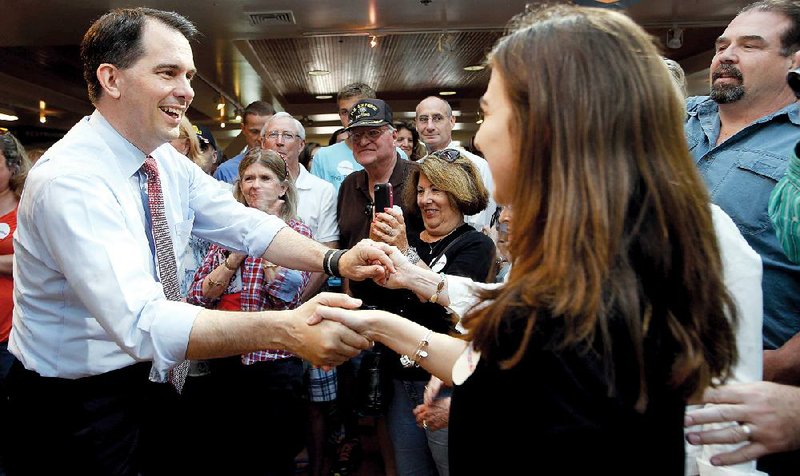CHICAGO -- Wisconsin's top court killed a criminal investigation of Gov. Scott Walker's 2012 election campaign, removing a potential stumbling block to his presidential bid.
The probe led by a former federal prosecutor sought to find whether Walker's campaign organization, which defeated an attempt to recall him from office that year, illegally coordinated efforts with outside groups exempt from donor disclosure laws.
The state Supreme Court's majority concluded the state law under which the court-appointed special prosecutor was pursuing the case was too vague to be constitutional.
That lack of clarity, they said, "leads us to the unsettling conclusion that it is left to government bureaucrats and/or individual prosecutors to determine how much coordination between campaign committees and independent groups is 'too much' coordination."
"This is not, and cannot, be the law in a democracy," Justice Michael Gableman wrote in the 4-2 decision. One justice didn't participate in the case.
Justice Shirley Abrahamson said in a dissenting opinion that "within the realm of issue advocacy, the majority opinion's theme is 'Anything Goes.'" She called her colleagues' interpretation of the state's campaign-finance laws "faulty" and their legal analysis "agenda-driven."
Walker, 47, announced July 13 that he was running for the GOP nomination, the 15th Republican to do so.
Walker is leading in early polling in Iowa, which hosts the nation's first nomination contest. Campaigning Thursday in New Hampshire, he called the ruling "just one more thing that allows us to take a step moving forward."
"I've gone through these battles so many times, I don't get too up or too down," he told reporters outside a diner in Amherst. "I'm pretty even-keeled in all this."
The justices ordered special prosecutor Francis Schmitz and the five local prosecutors on the case to stop investigating, return any seized property and destroy all of the information they had gathered. That covers millions of documents that were subpoenaed or seized, according to the ruling.
Schmitz "was the instigator of a 'perfect storm' of wrongs" visited upon those in the eye of the probe and "those who dared to associate with them," Gableman said in the ruling.
The justices stated as fact allegations that aren't true, such as a claim that people were prevented from contacting their lawyers, Schmitz said in a statement. He called the ruling a loss for independents, Democrats and Republicans alike.
"It defies common sense that a Wisconsin resident of average means who gives $25 to a campaign has his or her name publicly reported under the law but, according to this decision, someone who gives, for example, $100,000 to a group which closely coordinates with the same campaign can remain anonymous," he said.
The case is In the Matter of John Doe Proceeding -- State of Wisconsin ex rel. Three Unnamed Petitioners v. the Honorable Gregory Peterson.
Walker, who previously served as Milwaukee County executive, was elected governor in 2010. The next year, he and his legislative allies passed legislation curbing the power of some of the state's public-worker unions. That sparked protests at the state's Capitol in Madison, a string of unsuccessful legal challenges and, in 2012, the failed recall.
In other news from the Republican Party, former Florida Gov. Jeb Bush swung through the San Francisco Bay Area on a fundraising swing for his presidential campaign.
After arriving by ride-share service Uber at a town-hall event, Bush said that as president, he would embrace the kind of bottoms-up thinking common in startup culture to shake up schools, health care and business culture.
He addressed about 75 employees of Thumbtack, a startup company that links customers to service providers such as house painters and photographers.
"The government today in Washington looks more like General Motors in 1975," he said. "The government of the future needs to look more like Thumbtack."
In taking questions from the audience, he also said he would repeal President Barack Obama's health care law in favor of a model that lets consumers select their own coverage, such as high-deductible, low-premium plans free of mandates.
He called the Federal Communications Commission's latest efforts to regulate Internet broadband providers "a stupid idea." Major Silicon Valley content providers such as Netflix support regulating the companies that provide Internet access.
And in New Jersey, Gov. Chris Christie said Thursday that nonviolent drug offenders should have a better shot at rebuilding their lives and he wants to mend relations between communities and their police forces.
Outlining his vision of the criminal justice system, the Republican presidential candidate cited the city of Camden as a model for rebuilding trust between law enforcement and residents while also driving down violent crime.
"Peace on our streets is more than just the absence of violence," Christie said. "Justice isn't something we can jail our way to. Justice is something we have to build in our communities."
Camden's crime rates have fallen sharply in the past two years after a Christie-backed deal replaced the city's police force with a larger county-run one focused on having officers get to know the residents better.
Information for this article was contributed by Andrew Harris, John McCormick and Marie Rohde of Bloomberg News and by Janie Har, Geoff Mulvihill and Jill Colvin of The Associated Press.
A Section on 07/17/2015

